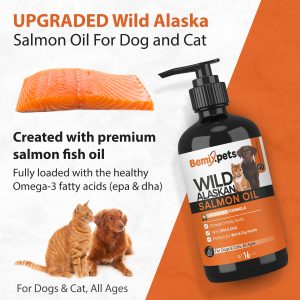If you're wondering if your dog can eat a banana, the answer is simple - yes, as long as it's a peeled fruit. However, that doesn't mean it should be a staple in your dog's diet or even a permanent part of it. Instead, it's a valuable addition or treats that many dogs love because of its taste.
Contents
It is crucial to properly process the ingredients we add to a dog's meals. Something that seems easily digestible to us, for animals can bring a lot of trouble - we're talking about raw vegetables and fruits, among others. So giving your dog a banana every day is not a good idea.
Indeed, it won't provide him with what he needs, but such a treat can make your pet happy. Yes, from time to time, it won't harm our pet, especially if the given piece will be adjusted to the size and weight of our pet. What's more, if our pet eats complete food and these are the basis of its diet, we can be calm - and occasional banana snacks won't be harmful.
We also mentioned the high-calorie content of bananas. The amount of energy we provide to our pets is very important - the body weight in the normal range, after all, is not only a matter of appearance but - above all - health. Dog meals and treats for pets, which are prepared by specialists, are in this regard adapted to their needs.
So if the argument for giving a banana to your dog is to make him have fun, it is definitely better to choose treats professionally tailored to animal needs. They will be not only delicious and healthy but also will help us to show a lot of affection to our pets. So let's bet on them... and let's keep bananas for ourselves!
Can dogs eat bananas? Contraindications for administration
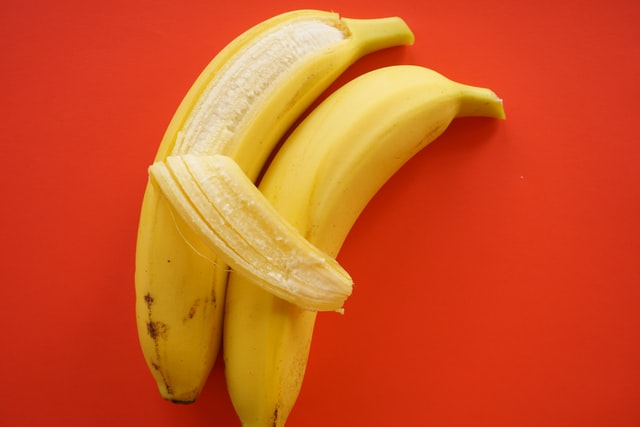
Now that you know if dogs can eat bananas, you still need to know that they are not recommended for every pet. In some cases, they can even worsen the condition. We're talking, for example, about dogs with cardiac problems - high potassium levels can worsen the disease's symptoms.
Animals suffering from diabetes or overweight and obesity should also not have bananas in their diet. They have a high glycemic index, which can even cause postprandial hyperglycemia. They also promote rapid weight gain due to their high sugar content, especially in miniature and small breeds.
Is a banana for a dog a good idea?
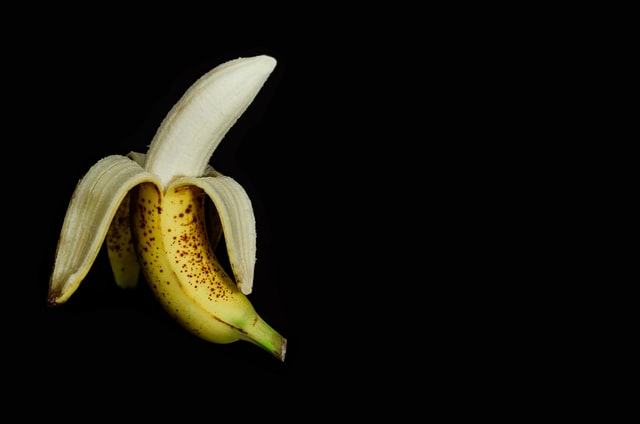
Banana for a dog? As a permanent element of the menu is not a good idea, but rest assured - if our pet eats a small piece of it from time to time, nothing wrong will happen. Following this line of thought, it's worth taking a closer look at bananas. First, they are rich in several vitamins - A, C, E, K, and B groups.
They also provide many minerals, such as magnesium and phosphorus. However, they are best known for being an excellent source of potassium. They also contain biotin and fibre, so crucial for the proper functioning of the digestive system. They are also tasty and sweet, mainly due to the sugars in which bananas are rich.
They have a high glycemic index and quite a large - for a fruit - calorific value (about 100 kcal per 100 g). They are great for active people because they provide a quick dose of - already mentioned - energy. However, we emphasize clearly that we are talking about people here, and the human diet is not recommended for animals.
We have different nutritional needs, and our bodies (including the digestive system) work differently. Yes, we are close with our dogs, who are full members of our families, but this does not mean that we should function the same way in all matters.
Banana for your dog? You won't find it in the recommendations!
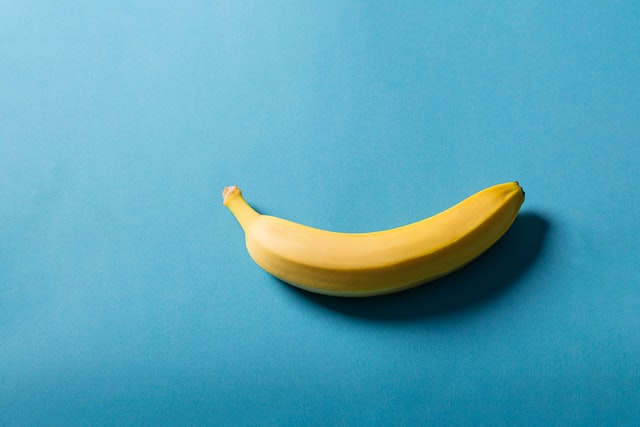
What ingredients are mentioned, among others? It is indicated that in the diet of dogs should be more than 40 different nutrients - only their presence will allow us to fully take care of the health of our four-legged friends.
What's important is it's not just the "presence" of these ingredients that counts, but also their quality and quantity (in terms of proportions between them). We're talking about proteins, amino acids, vitamins, micro-and macroelements, and fats. The content in a dog's meals must be balanced - that's why we can say that a given meal is complete, and unfortunately, we're unable to evaluate it "by eye." That's why it's so important to rely on the knowledge of professionals who, both in wet and dry food, can include what's most important.
Proteins and amino acids - proteins are essential, among other things, in maintaining the proper muscle mass of the animal, thanks to which it has strength, is agile, and is ready for active play with us! In the diet of dogs, it is essential to provide the necessary amino acids - protein components. As for bananas, they aren't a good source of these, as they consist mainly of carbohydrates.
Omega-3 fatty acids - are important for the functioning of our pets, as they affect the immune system and cardiovascular and endocrine systems. Interestingly, polyunsaturated fatty acids also have a beneficial effect on the nervous system, including on animal behaviour.
Suppose their level in the dog's body is appropriate. In that case, it will help to support his perceptiveness and maintain the desire to play with us - and after all, these moments of closeness and fun together are priceless! Furthermore, healthy fats are also essential for a dog's coat and skin - among other things, they inhibit various inflammatory processes. What's important in the context of this article - bananas for dogs won't provide these fats!
Minerals - a dog's diet must include an adequate amount of calcium and phosphorus. "Adequate calcium and phosphorus also mean maintaining the correct ratio. This has a significant impact on your pet's skeletal system. Furthermore, the bone tissue is also influenced by magnesium, which is also important for the nervous system.
As far as the circulatory system is concerned - our four-legged friends need, among other things, iron for its proper functioning. Also important are zinc, copper, selenium, manganese, sodium, iodine, potassium, and others - each of those elements, if given correctly, will support your dog's shape and condition. This will keep him feeling great physically, but you'll also see the sparkle in his eye and the joy hiding behind it!
Conclusion
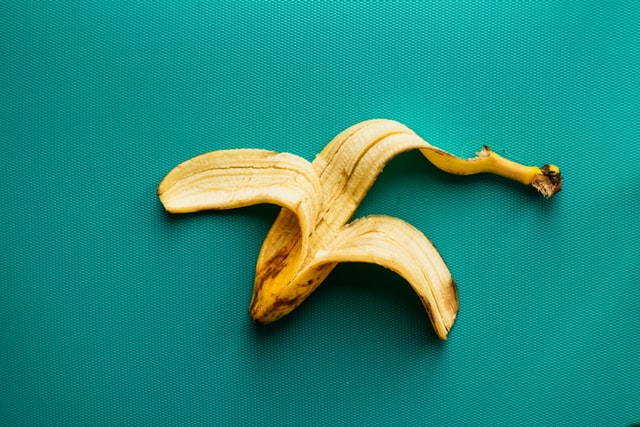
While bananas are served in small amounts and from time to time will not harm your dog and at the same time provide him with needed nutrients, large amounts of bananas - especially eaten at one time - can cause several unpleasant symptoms.
Bananas contain large amounts of starch and are not digested by digestive enzymes, and large amounts can cause annoying constipation.
The second issue is the presence of potassium, which bananas contain up to 360 mg per 100 g of product! Too much or too frequent consumption of bananas can contribute to heart problems.
Bananas are also a calorie-dense snack - while it's perfect for active dogs that use a lot of energy every day during training or work when it comes to older or less active dogs, the calorie content may cause weight gain.
There are also cases where bananas should not be given to dogs under any circumstances. These include heart disorders or diagnosed cardiac diseases. Diabetes in a dog is also a contraindication. Bananas have a high glycemic index, which raises blood sugar levels when eaten. If your dog is ill, this can prove to be very dangerous.
If your dog is healthy and you are giving him bananas, ensure it is done at appropriate intervals. Dried banana chips will also undoubtedly work as a good snack - provided that they are natural and contain no extra sugar.
Bananas in your puppy's diet
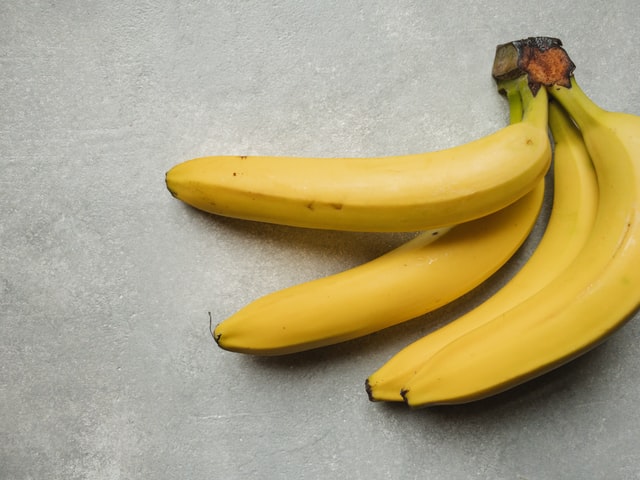
Bananas are often given as a snack to young children. And for a good reason. In addition to the array of health benefits and beneficial ingredients they contain, their texture is important. They are soft and easy to bite, and their size is perfect for a one-time snack. This thinking can also lend itself to freshly minted caregivers of canine toddlers. Can a dog eat bananas while still a puppy?
It's important to remember that puppies have specific nutritional requirements, and optimal amounts of each ingredient must be provided for proper growth and development. Not only are deficiencies harmful - but excesses can also cause problems.
Bananas can be given, but only in small amounts and from time to time - under no circumstances should they be a permanent part of a dog's diet. It's worth noting that an average-sized banana can be more significant than most puppies! So let's approach the situation rationally and give the dog bananas. Let's take care of the appropriate portion size.

